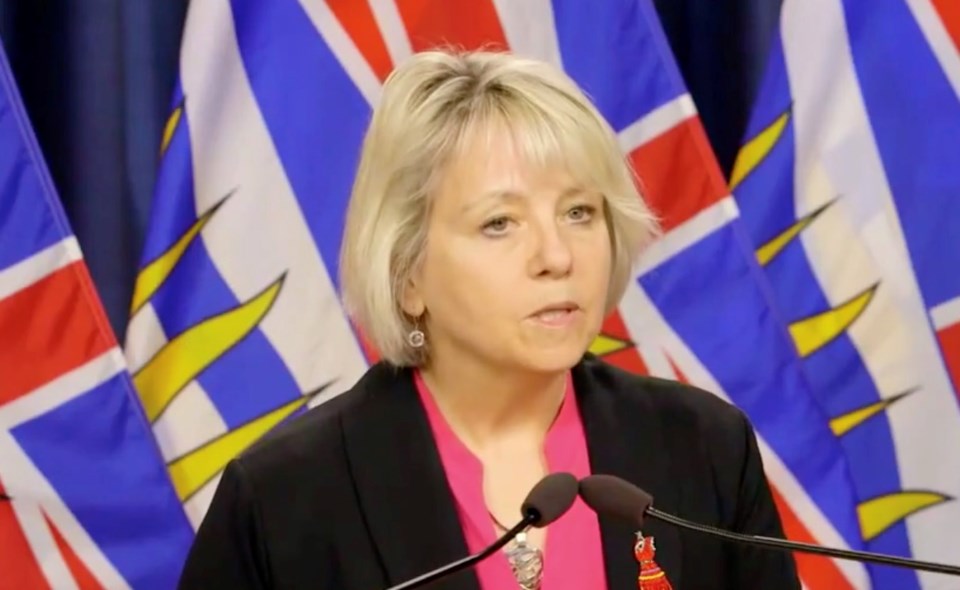B.C. has 2,814 active COVID-19 infections, which is the fewest since August 6, but one sign of concern relates to provincial health officials' revelation that five of those infections are the Omicron variant.
Scientists are concerned about the Omicron variant because it has 32 mutations from the original strain of the SARS-CoV-2 virus, which causes COVID-19, and that degree of difference may enable it to evade vaccines.
Early signs show that Omicron prompts milder cases of illness, but experts, such as U.S. White House chief medical advisor Anthony Fauci, have said it is too soon to be sure.
All five known Omicron patients in B.C. are believed to have contracted the virus while travelling internationally. None of the five has an illness severe enough to need hospital treatment. Two of the five patients are unvaccinated, B.C. provincial health officer Bonnie Henry told media December 7.
The unvaccinated people were Canadians who left the country to visit African nations that did not require all incoming visitors to be vaccinated at the time when the Canadians arrived, Henry said. Since late November, Canada has required all people getting on planes in Canada to be vaccinated.
"Canadians who go places and return ... need to be tested," Henry said. "There's a testing and quarantine program, and the unvaccinated people were part of that testing and quarantine program, and were tested again, when we had concerns about Omicron arising."
B.C.'s count of active COVID-19 infections has declined, as recoveries outpace newly diagnosed cases.
There were 326 new COVID-19 cases detected in the past day, for a total of 220,856 since the first infection was detected in the province in on January, 28, 2020. Of those, 215,577 are considered by the government to have recovered.
The B.C. government usually considers COVID-19 patients to have recovered if they have gone 10 days following first feeling symptoms, as they are therefore deemed to no longer be infectious. Some patients, however, continue to have health problems for months after their recoveries.
One person, in the Northern Health region, has died from COVID-19, according to the government.
The 326 new cases detected in the past day include:
• 92 in Fraser Health;
• 53 in Â鶹´«Ã½Ó³»Coastal Health;
• 88 in Interior Health;
• 22 in Northern Health; and
• 71 in Island Health.
The 2,814 active cases include:
• 930 in Fraser Health;
• 471 in Â鶹´«Ã½Ó³»Coastal Health;
• 561 in Interior Health;
• 261 in Northern Health; and
• 591 in Island Health.
The number of COVID-19 hospitalizations in B.C. has been on the decline, and now stands at 242. Of those, 82 are in intensive care units – the fewest since August 25.
One month ago, B.C. had 441 COVID-19 patients in hospitals.
Despite the steady decline in the number of COVID-19 patients in B.C. hospitals, Health Minister Adrian Dix stressed on December 7 that the province's hospitals are "extremely busy."
In total, 9,806 of B.C.'s 12,310 hospital beds are filled, he said.
The province has 11,582 beds in what it calls "acute care," which includes most patients' needs. Of those, 9.330 beds are filled, Dix said.
Another 728 B.C. hospital beds are in ICUs, and are for patients who have more serious illnesses or need special attention. Those beds include 510 that existed before the pandemic, and do not need extra staff resources. Another 218 ICU beds were added during the pandemic, are for emergencies and are called "surge" beds. In total, 476 patients are in B.C. ICUs, Dix said.
To make room for patients in areas, such as the Northern Health region, where ICU occupancy is at or near capacity, 150 people have been flown to the Lower Mainland and Â鶹´«Ã½Ó³»Island. Of those, 117 have COVID-19, Dix said, adding that the vast majority of those have not been vaccinated.
Unvaccinated people continue to be the ones most spreading the disease.
Between November 29 and December 5, people not fully vaccinated accounted for 58.7% of new cases, and between November 22 and December 5, those individuals accounted for 63.1% of hospitalizations.
This is despite the vast majority of British Columbians being fully vaccinated.
B.C. government data show that 4,267,612 residents have had at least one dose of vaccine, while 4,088,609, or 95.8% of those are fully vaccinated with two doses.
Children as young as five years old started to get vaccinated on November 29, and as a result there has been a jump in the number of new people getting their first doses of vaccine. There were 6,295 people who got their first dose of vaccine in B.C. in the past day. Another 2,674 received their second dose.
Victoria estimates that 85.6% of eligible British Columbians, older than five years, have had at least one vaccine shot, while 82% of that eligible group is fully vaccinated with two jabs.
The B.C. government last year estimated in that the , so Glacier Media's calculation is that more than 82.9% of B.C.'s total population has had at least one dose of vaccine, and 79.4% of the province's total population has had two doses.
Booster shots in B.C. have started to be given to immunocompromised people, those older than 70 years who have gone six months after their second dose, as well as to healthcare workers and those who received two AstraZeneca doses of vaccine, and have gone six months since their second dose. Others older than 18 years are expected to be allowed, in stages, to get booster doses in 2022.
So far, 504,977 people in B.C. have received their booster dose, according to today's data. That is 12,741 more than yesterday.
There were no new outbreaks at health-care facilities in the past day. That leaves the province with five such outbreaks. •



